- Home
- Simon Kernick
The Business Of Dying Page 2
The Business Of Dying Read online
Page 2
Instead, I turned away from his stare and reloaded. Then I stepped forward and shot him three times in the top of the head. The mobile phone he was carrying clattered noisily to the ground.
I dropped the gun into my jacket pocket and turned towards Danny, who was now bringing the car round.
Which was when I saw her, maybe fifteen yards away, standing in the light of the rear firedoor, a bag of rubbish in each hand. No more than eighteen and looking right at me, still too shocked to realize that what she was witnessing was real. What do you do? A movie pro would have taken her out with a single shot to the head, although there was no guarantee I’d even have hit her from where I was standing. And anyway, I’m not interested in hurting civilians.
Her hand went to her mouth as she saw I’d seen her, and I knew that any moment she was going to let out a scream that would probably wake the dead, which, with the dead only just being dead, I didn’t want at all. So I lowered my gaze and hurried round to the passenger door, hoping that the gloom and wet had obscured my features enough to make any description she gave worthless.
I jumped in and kept my head down. Danny didn’t say a word. He just hit the pedal and we were out of there.
It was 9.04.
The journey to our first change of transport took exactly four minutes and covered a distance of approximately two and a half miles. We’d parked a Mondeo in a quiet piece of Forestry Commission land earlier that day. Danny now pulled up behind it, cut the engine, and got out. I leaned under the passenger seat and removed a full five-litre can of petrol which I liberally sprinkled over the car’s interior. When it was empty, I got out, lit a book of matches, stepped back so I was well out of the way, and flung them in, followed by the murder weapon and the two-way radio I’d been using. There was a satisfying whoosh as the petrol ignited, followed by a wave of heat.
When they came across the mangled wreckage it wouldn’t tell them anything. We hadn’t left any fingerprints and the car itself would be almost impossible to trace. It had been stolen in Birmingham six months ago, given new plates and a respray, and stored in a lock-up in Cardiff ever since. In this line of business, you can never be too careful. Contrary to popular belief, most detectives couldn’t detect a heartbeat on a speed addict, but you never know when you might be up against the next Ellery Queen.
We now followed a pre-arranged route for four miles through a mixture of B and single-track roads and it was 9.16 when we pulled into the car park of Ye Olde Bell, a busy country pub on the edge of an affluent-looking commuter village. Danny drove up to the far end and stopped behind a burgundy Rover 600.
This was where we parted.
‘Did that girl get a good look at you?’ he asked as I opened the door. They were the first words he’d spoken since the shootings.
‘No, we’ll be all right. It was too dark.’
He sighed. ‘I don’t like it, you know. Three murders, and now we’ve got a witness.’
Admittedly it didn’t sound too good when he put it like that, but at the time there was no reason to think that we weren’t in the clear.
‘Don’t worry. We’ve covered our tracks well enough.’
‘There’s going to be a lot of heat over this one, Dennis.’
‘We both knew that when we took the job. As long as we keep calm, and keep our mouths shut, we won’t feel any of it.’
I gave him a friendly pat on the shoulder, and told him I’d call him the next day.
The Rover’s keys were behind the front driver’s-side wheel. I got in, started the engine and followed Danny out of the car park. He turned south and I turned north.
And that should have been that, but tonight was not my lucky night. I’d barely gone three miles and was just short of the turning that would take me back to London when I hit an improvised roadblock. There were two Pandas with flashing lights at the side of the road: officers in fluorescent safety jackets were milling about a BMW they’d already stopped. My heart gave an initial jump but I quickly recovered myself. No reason to worry. I was a man on my own, unarmed, driving a car that had never been within five miles of the Traveller’s Rest, and they wouldn’t even have the vaguest description of me yet. The clock on the dashboard said 9.22.
One of them saw my approach and stepped out into the road, flashing his torch and motioning for me to pull up behind the other car. I did as I was told and wound down the window as he approached the driver’s side. He was young and no more than twenty-three, and very fresh-faced. They say you can tell you’re getting old when the coppers look young and I could just about have been this kid’s dad. He looked really enthusiastic as well. That wouldn’t last. A second officer stood a few feet behind him, watching, but the other two were preoccupied with the driver of the other car. None of them appeared to be armed, which I thought was a bit foolish under the circumstances. I could have run this roadblock and they wouldn’t have had a chance. I still could.
‘Good evening, sir.’ He leaned down into the window and gave me and the car a gentle once-over.
It always pays to be polite. ‘Evening, officer. How can I help?’
‘There’s been an incident at a hotel called the Traveller’s Rest on the A10. About fifteen minutes ago. You haven’t come that way, have you?’
‘No, I haven’t,’ I told him. ‘I’ve come from Clavering. I’m on my way to London.’
He nodded understandingly, and then looked at me again. You could tell that for some reason he wasn’t entirely convinced, although I don’t know why. I’m not the type who arouses suspicions. I genuinely look like a nice guy. There shouldn’t have been any alarm bells.
But there were. Maybe I’d just met the new Ellery Queen.
‘Have you got any identification, sir? Just for the record.’
I sighed. I didn’t want to have to do this because it could well cause me a lot of long-term problems, but I didn’t see that I had much choice.
For a split second I baulked. But a split second was all I had.
Then I reached into my pocket and removed the warrant card.
He took it, inspected it carefully, looked back at me, then back at the warrant card, just to double check, probably wondering why his instincts were so wrong. When he looked back again, he had an embarrassed expression on his face.
‘Detective Sergeant Milne. I’m sorry, sir. I didn’t realize.’
I shrugged my shoulders. ‘Course you didn’t.
You’re just doing your job. But if you don’t mind, I’m in a bit of a hurry.’
‘Of course, sir, no problem.’ He stepped back from the car. ‘Have a nice evening.’
I said goodnight, and put the car in reverse. Poor sod. I remembered only too well what it was like to be out on nights like these, being paid a pittance to stand around for hours on end with the rain pissing down on your head. Knowing that the people you were meant to be looking for were probably miles away. Oh, the joys of being a uniformed copper.
I waved as I drove past, and he waved back. I wondered how long it would take him to lose the enthusiasm; how long before he, too, realized that by playing by the rules he was just banging his head against a brick wall.
I gave him two years.
2
I used to know a guy called Tom Darke. Tomboy, as he was known, was a buyer and seller of stolen goods. If you’d nicked something – whatever it was – Tomboy would give you a price for it, and you could be sure that somewhere down the line he’d have a customer who’d take it off him. He was also an informant, and a good one too if you measure such things by how many people his information convicted. The secret of his success lay in the fact that he was a likeable character who was good company. He used to say that he listened well rather than listened hard, and he never asked too many questions. Consequently, there wasn’t a lot that went on among the North London criminal fraternity that he didn’t know about, and such was his affability that even as the local lowlifes were going down like overweight skydivers no one ever suspected old Tomboy of
being involved.
I once asked him why he did it. Why, as the Aussies would say, did he dob in blokes who were meant to be his mates? Because the thing was, he didn’t really strike me as the grassing sort. He came across as being a decent bloke who was above such petty deceptions. Tomboy had two answers to this question.
The first answer was the obvious one. Money. There were good rewards on offer for information on criminals and Tomboy needed the cash. He wanted to retire from the game with his freedom intact because he believed that with the onset of technology, and its availability to the police for fighting crime, the writing was on the wall for middle-ranking career criminals such as himself. So it was a case of making hay while the sun shone, building up a nice little nest egg (he’d set a target limit of £50,000), and then getting the fuck out.
The second answer was that if he didn’t dob them in, someone else would do it anyway. Criminals are usually notorious braggarts. Since they can’t tell the whole world what they’ve done for fear of retribution, they like to boast about their exploits to one another. And since by definition they’re a dishonest lot – as Tomboy once said, ‘Whoever heard of such a thing as honour among thieves?’ – sooner or later someone’s going to inform on them if the money’s right. All he did, if you believed his rationale, was get in there first.
So that was Tomboy’s philosophy. There’s no point in not doing the deed because one way or another it’s going to get done, and if you’re going to get paid to do it, all the better. I thought about that as I drove home through the rain that night. If I hadn’t killed those men, someone else would have shot them. Either way they ended up dead. If you’re in the line of business where you make enemies of people who’ll pay to have you killed, you’ve got to be prepared to accept the consequences. That was how I justified it to myself, and that was how Tomboy had always justified it to me, and it had never done him any harm. In fact, it appeared to have done him a lot of good. The last I’d heard he was living out in the Philippines. He’d made his fifty grand, probably a lot more knowing him, and had invested it in a beach bar and guesthouse on one of the more far-flung islands. He’d sent me a postcard from there a couple of years back on which he’d extolled the virtues of the laid-back tropical lifestyle. It had ended with him saying that if ever I fancied a job working at his place, I should let him know.
More than once I’d felt like taking him up on the offer.
It was getting close to eleven o’clock when I got home that night, home being a rented one-bedroom flat at the southern end of Islington, not too far from City Road. The first thing I did was take a long hot shower to wash the cold out of my bones, before pouring myself a decent-sized glass of red wine and settling down on the lounge sofa.
I turned on the TV and lit a cigarette, relaxing properly for the first time that day. I took a long slow drag, enjoying the fact that a potentially hazardous job had been completed successfully, and flicked through the channels until I found a report on the killings. It didn’t take long. Murder’s a numbers game. Kill one person and you barely make the inside pages. Kill three, especially in a public place, and it’s big news. It adds a bit of excitement to the mundane grind of people’s lives; even more so when it bears all the hallmarks of a so-called gangland shooting. Shootings are entertaining because they’re not too personal. They make good conversation points.
Understandably, details were still very sketchy. The programme I was watching had a young female reporter on the scene. She looked cold but excited to be involved in what was potentially a meaty, career-enhancing story. It was still raining, only now it had turned into that light stuff that always seems to soak you more. She’d positioned herself in the rear car park and you could make out the Cherokee in the background about twenty yards away, behind reams of brightly coloured scene-of-crime tape. There were a lot of police and forensic staff in lab coats swarming all over it.
The report didn’t last long. The girl confirmed that three people had been murdered – no idea as to identities – and speculated that they’d been shot. She then wheeled over the hotel’s deputy manager, a tall, spotty young man who looked like he’d just got out of school, for his comments. They weren’t, it has to be said, very enlightening. Squinting through his spectacles, he explained that he’d been working in the reception area when he’d heard a number of faint popping sounds (they all say that) coming from the rear car park. He’d thought nothing more of it but then one of the kitchen workers had come running in screaming and shouting that there’d been a murder. He, the deputy manager, had bravely gone out to investigate and had immediately discovered my handiwork, which was when he’d called the police. ‘It was very shocking for all of us,’ he told the reporter. ‘You don’t expect this sort of thing in a quiet area like this.’ They all seem to say that as well.
The reporter thanked him before turning back to the camera and breathlessly promising further information as and when she received it. She then signed off, and it was back to the studio. It seemed I’d made her night anyway.
I took a drink of wine, taking my time swallowing it, and switched over. There was a programme about great white sharks on the Discovery Channel, and I sat watching that for a while, not really paying too much attention. Although I tried to empty my mind of the day’s events, it was difficult not to think about the murders. I suppose it was only now that the full enormity of what I’d done was beginning to sink in. Three lives snuffed out, just like that. It felt like I’d crossed a threshold. I’ve killed before, I suppose that’s obvious by now, but only twice, and in vastly different circumstances.
The first time was twelve years ago. I’d been one of a number of armed officers who’d turned up to a domestic incident at a house in Haringey. A man was threatening his common-law wife and their two young children with a gun and a carving knife. They’d got people trying to negotiate with him over the phone but the guy was drugged up to the eyeballs, shouting incoherently, and they weren’t really getting anywhere.
Siege situations are the most frustrating a police officer can get involved in. You’ve got very little control over events so you can never really relax an inch, just in case something happens. But more often than not, nothing does. The suspect mulls over his actions, finally works out that he’s trapped and that he’s not going to get out of there except in handcuffs or a box, and eventually releases his hostages and simply walks out the door. It’s frustrating because you want to be doing something to help end the situation, yet in most ways you’re pretty much irrelevant to it.
On the day of the Haringey siege I remember it was hot. Stiflingly hot. We’d been on the scene about an hour and had the place completely surrounded when, without warning, our hostage taker had suddenly appeared in the front window, naked from the waist up, holding his gun. He was a big guy with the beginnings of a pot belly and a tattoo of an eagle straddling his chest. He’d shouted something from behind the glass, then opened the top part of the window and stuck his head out, shouting something else unintelligible. I was ten yards away behind a car on the street. Another officer was crouched down beside me. He was about fifteen years older than me and his name was Renfrew. I remember he got pensioned off a couple of years later after he got a glass in the face trying to break up a pub fight. Renfrew cursed the guy under his breath. You could tell he wanted to shoot him. Why not? The guy was just a waste-of-space dopehead who caused a lot more harm to the world than good. But Renfrew was a pro and, like a lot of coppers, he had one eye on the pension, so he was never going to do anything that might jeopardize his career. I was still a bit idealistic in those days. I didn’t think about the pension. I thought about the wife and kids stuck in there with an unpredictable maniac.
I’d had an earpiece on. The chief superintendent spoke into it. Don’t fire, he said. We’re still negotiating. Keep him in your sights, but don’t fire.
Then, just like that, our target had brought the gun up and pointed it wildly towards us. The chief superintendent hissed somethin
g else into my earpiece, but I didn’t hear it. It looked like the suspect was going to pull the trigger. I knew he wouldn’t hit me from where he was standing. I had good cover, and he looked too stoned to aim straight, but I was still nervous. And angry. This bastard was just showing off his power, knowing we’d have to stand there like lemons, hamstrung by our limited rules of engagement. That got me; it really did.
So I’d fired. Two shots from the Browning. Straight through the window and into his upper body. One of them got him in the heart, but the autopsy confirmed that either of the bullets would have been fatal on its own. He died instantly, I think. Certainly before anyone could administer first aid.
I was offered psychological counselling and I took it because I was told that if I didn’t, it would look like I didn’t care that I’d killed a man. It didn’t do me much good, mainly because I genuinely didn’t care that I’d killed him. In fact, I was quite pleased. He’d wanted to kill me and I’d got in there first. But of course I didn’t tell the counsellor that. I told him I deeply regretted having to take a life, even if it was in the line of duty. I guessed that that was what he wanted to hear.
There was an inquest, and I was forced to give evidence. There was even talk about a criminal trial, especially when it was discovered that the gun he’d been holding was a replica. I was suspended for close to two months, although at least it was on full pay. On the second day of the inquest, I was leaving the building by a side door when I ran into the common-law wife and her brother. She spat in my face and called me a murderer while the brother punched me in the side of the head. A uniformed officer intervened before things went any further, but the incident taught me two things. One, never rely on the support of people you’re trying to help. As politicians have often found out to their cost over the years, the hand that pats you on the back one day can just as easily grab you by the balls the next. And two, never rely on anyone else for support either. In this world, you’ve got to get used to the fact that, in the end, you’re always on your own.

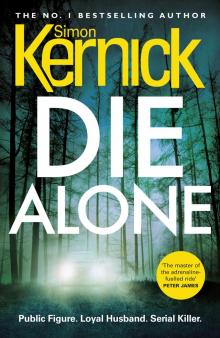 Die Alone
Die Alone Deadline
Deadline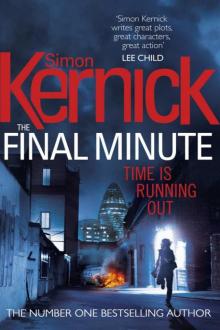 The Final Minute
The Final Minute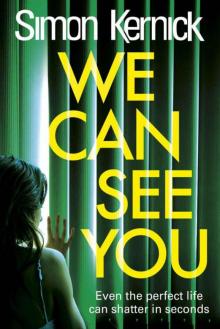 We Can See You
We Can See You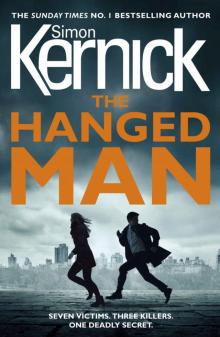 The Hanged Man (Bone Field 2)
The Hanged Man (Bone Field 2)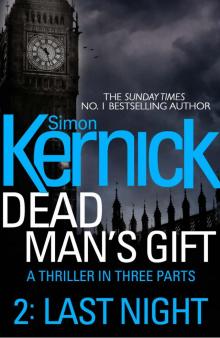 Dead Man's Gift 02 - Last Night
Dead Man's Gift 02 - Last Night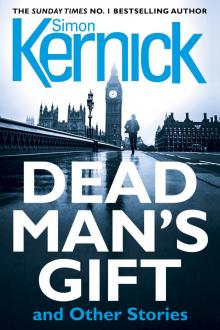 Dead Man's Gift and Other Stories
Dead Man's Gift and Other Stories A Good Day To Die
A Good Day To Die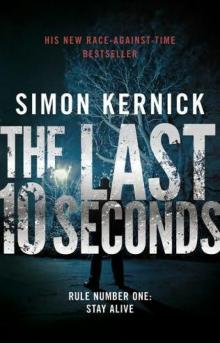 The Last 10 Seconds
The Last 10 Seconds The Murder Exchange
The Murder Exchange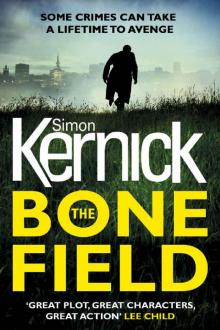 The Bone Field
The Bone Field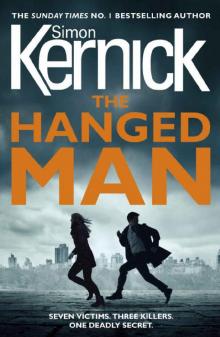 The Hanged Man
The Hanged Man Target
Target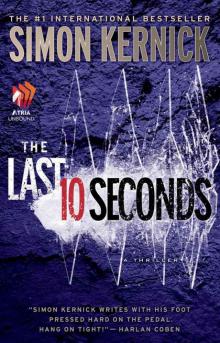 The Last 10 Seconds: A Novel
The Last 10 Seconds: A Novel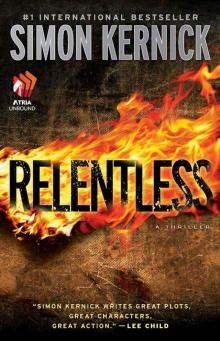 Relentless: A Novel
Relentless: A Novel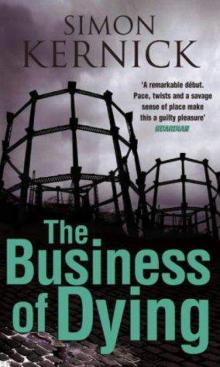 The Business Of Dying
The Business Of Dying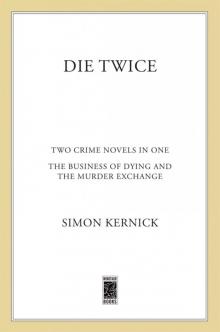 Die Twice
Die Twice Flytrap
Flytrap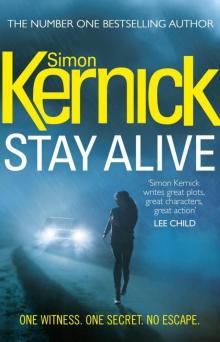 Stay Alive
Stay Alive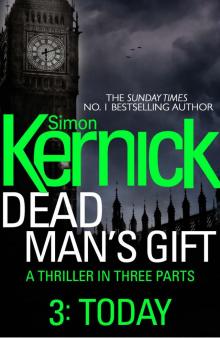 Dead Man's Gift 03 - Today
Dead Man's Gift 03 - Today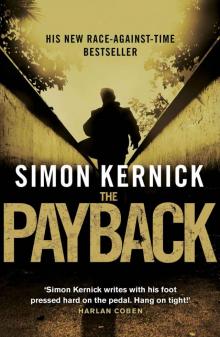 The Payback
The Payback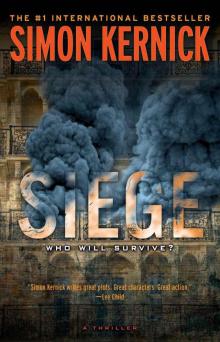 Siege: A Thriller
Siege: A Thriller The Crime Trade
The Crime Trade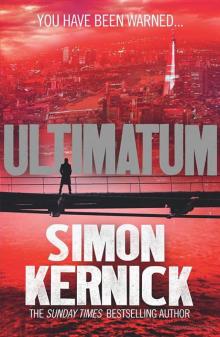 Ultimatum
Ultimatum